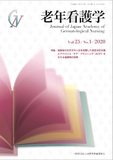Japanese
English
- 販売していません
- Abstract 文献概要
- 参考文献 Reference
抄録
研究目的は,急性期病院における認知障害高齢者の転倒に繋がりうる行動とその背景にあるニーズを,転倒発生の多い入院1週間に焦点を当ててせん妄発症の有無により分析し,明らかにすることである.対象者は,急性期病院に入院した認知障害高齢者9人であった.方法は参加観察法である.転倒に繋がりうる行動が観察された際に本人のニーズを聞き取り,ケアによって行動が落ち着いた場合を真のニーズとしてとらえ,行動を意味・内容ごとに分類した.その結果,非せん妄時では,転倒に繋がりうる行動は7項目観察され,その背景にあるニーズは“生理的欲求・習慣”“身体的苦痛・不快”“精神的ストレス”の3カテゴリーであった.行動の背景には本人の明確な意思があり,その意向が尊重されないことによるストレスを抱えていた.せん妄発症時では,転倒に繋がりうる行動5項目と“現状認識困難による不安”“身体的苦痛・不快”の2カテゴリーのニーズが見いだされ,ひとりでいることへの不安や,治療や疾患から生じる複数の苦痛があった.本人の意思を尊重した生活支援や,身体的苦痛・不快や不安への早期介入による転倒予防の可能性が示唆された.
The purpose of this research was to clarify the “fall behaviors” and real needs in the background of older people with cognitive impairment in an acute hospital by analysis of patients with and without the onset of delirium, focusing on the first week of admission when falls most frequently occur.
The subjects were nine older people with cognitive impairment admitted to an acute hospital. The research was conducted via the participant observation method. The real needs found to influence the background of their behaviors were identified through a hearing investigation with those in whom the “fall behaviors” were observed, and their involvement with nurses when their behaviors were calm once again, as well as their other behaviors were each analyzed by content for meaning.
As a result, seven “fall behaviors” were observed, and at the time of “non-delirium,” three categories, “physiological desire and custom,” “physical pain and discomfort,” and “mental stress”, were observed as the background needs of their behaviors. The subjects had clear intentions in the background of their behaviors and were stressed because their intentions were not reflected. At the time of delirium, five categories that could lead to fall behavior, and the needs of two further categories of “uneasiness caused by the difficulty of recognition of their current situation” and “physical pain and discomfort” were recognized. Individuals felt uneasy about being left alone and about several pains caused via disease and treatment.
This suggested that livelihood support respecting intention, and early intervention to their physical pain, unpleasant feelings, and anxiety can possibly prevent such a fall behavior.
Copyright © 2020, Japan Academy of Gerontological Nursing All rights reserved.


